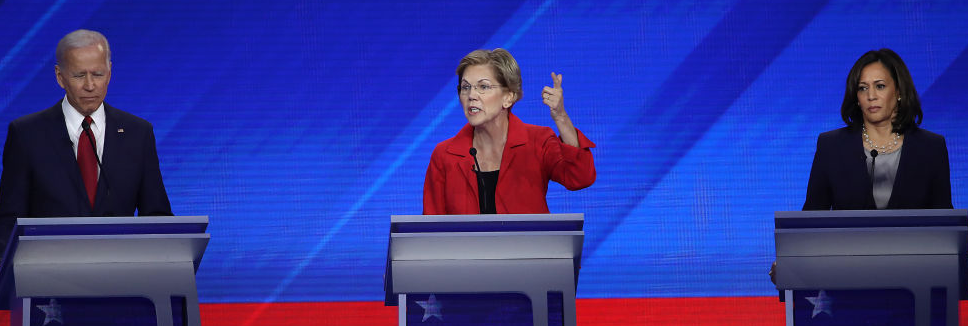If Joe Biden were to ask his supporters to choose a running mate from his short list of potential vice-presidents, there would be no clear front runner. Four months away from the presidential election, Senators Kamala Harris and Elizabeth Warren currently lead the pack, according to recent Economist/YouGov polling. If Biden were to ask the same question of his least enthusiastic supporters, on the other hand, Warren would have an edge.
Of course, the choice of a running-mate is up to only one voter – Joe Biden – and public opinion of the contenders is just one of many factors Biden is likely weighing. Nonetheless, our survey data provides a window into the potential for some of the better known VP prospects to help Biden unify and energize his support.
The two Economist/YouGov surveys, conducted June 21–23 and June 28–30, 2020, asked Biden supporters to choose his running mate from a short list of potential nominees reportedly being vetted by the Biden campaign. The list included only women since (Biden has pledged to name a woman as his running mate.)
California Sen. Kamala Harris topped the list both weeks, preferred by roughly one in four Biden voters, edging out Massachusetts Sen. Elizabeth Warren by only a few percentage points. The other potential VP selections garnered only single digit support, though former Georgia House Democratic leader Stacey Abrams runs a consistent third.
At the same time, roughly one in four Biden voters are unsure which woman they would select as Biden’s running mate, so if the VP nod were up for a popular vote, the initial lead for Harris and Warren would be very tenuous.
The current standings represent a change from similar questions asked on Economist/YouGov polling in March and April, when Warren had a slight advantage over Harris. This change may reflect recent public pressure on Biden from some prominent party activists to choose a Black woman as his running mate. Over the last two weeks, more than half (55%) of Biden voters say he should choose someone who is Black to be the Democratic Party nominee, and only 6 percent say he should not.
Beyond the current standings, however, the lead that Harris and Warren enjoy as VP choices owes mostly to their greater familiarity — a greater percentage who can rate them favorably or unfavorably — earned through their own candidacies for the Democratic nomination.
Not surprisingly, among Biden voters, the more familiar people are with a potential VP candidate -- indicated by their willingness to rate them favorably or unfavorably -- the greater the percentage that chooses them on our preference question.
This result raises an important caution about reading too much into the current polling snapshot: Whomever Biden chooses will gain nearly universal name recognition practically overnight. The survey data cannot tell us about the impressions that will be formed once Biden announces his choice.
Nevertheless, the profiles of the better known prospects are not identical among subgroups of Democrats, and these differences help illustrate some of the challenges Biden faces.
Consider enthusiasm: The Economist/YouGov poll has been tracking reported enthusiasm for both Biden and Trump, and Biden’s supporters have consistently expressed less enthusiasm about him than Trump voters express about their candidate.
The vice-presidential selection gives Biden an opportunity to address that deficit, so we looked more closely at how Biden’s least enthusiastic supporters assess the potential running mates.
Start with the favorable ratings. Perhaps not surprisingly, each of the prospective candidates is better known and more favorably rated among the Biden voters who say they feel “enthusiastic” about supporting him (18% of all registered voters). All of their ratings are slightly lower among Biden voters who say they are “satisfied but not enthusiastic” about Biden (23% of all registered voters) and lower still among the remaining Biden voters who say they feel “dissatisfied”,“upset”, or “not sure” about Biden or are unable to answer (8% of registered voters).
That last, least enthusiastic segment is critical, because it amounts to the difference in Biden support of between 41 percent and 49 percent of the registered voters—the voters Biden must hold to win.
Note, however, that the gap in favorable ratings between enthusiastic and unenthusiastic Biden voters is far narrower for Warren than for Harris. The two senators earn essentially identical ratings among Biden’s most enthusiastic voters, with Harris (83%) two points higher than Warren (81%). However, among the least enthusiastic Biden voters, Warren’s rating (63%) is eight points higher than Harris’ (55%).
The difference is more pronounced on the question about preferred VP choice. Among the most enthusiastic Biden voters, Harris (at 32%) holds a significant lead over Warren (17%) and Abrams (7%). Among the least enthusiastic Biden voters, however, the order is reversed: Warren (at 31%) is the clear choice over both Abrams (11%) and Harris (10%).
The preference for Warren among the least enthusiastic Biden supporters has a clear explanation: Nearly three out of four say they voted in the Democratic primaries, and those that did preferred Bernie Sanders to Biden by a whopping 50-point margin (72% to 22%; in contrast to enthusiastic Biden voters, who preferred him to Sanders by similarly overwhelming margins). The least enthusiastic Biden voters are also more liberal (63%), younger (55% under the age of 45),more likely to be a woman (64%) than other Biden supporters.
These points suggest Biden still has work to do to unite his party and energize his support. His vice-presidential selection may tell us how important he considers that task.
See the full toplines and crosstables results from this week's Economist/YouGov poll
Methodology
:
None















